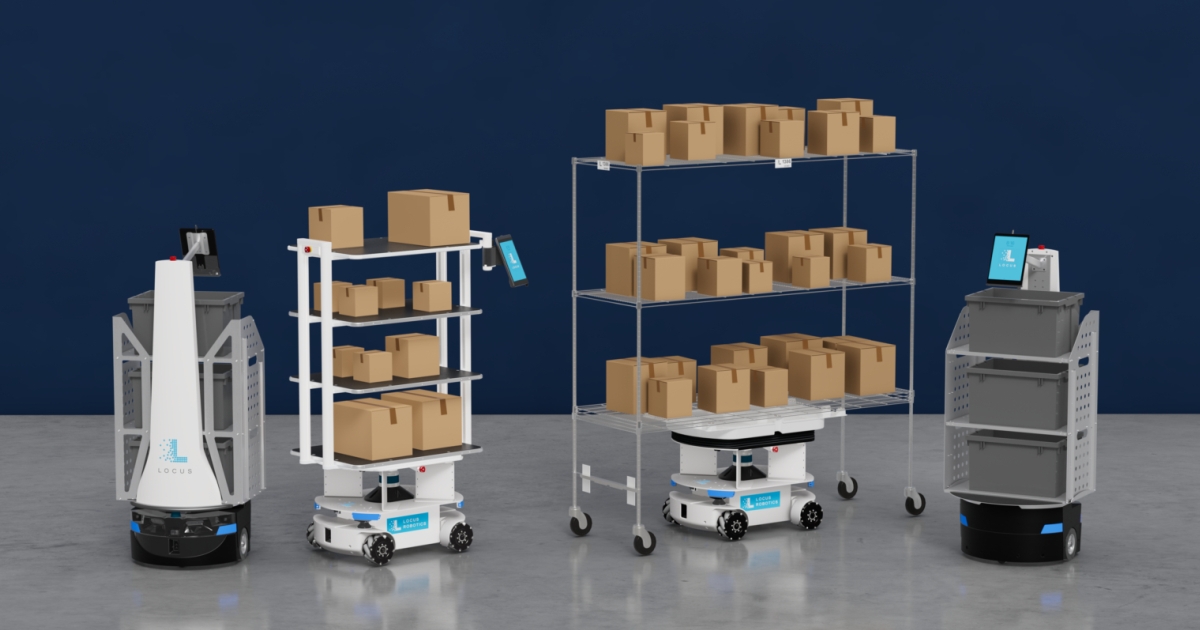
In IIoT, there are myriad technologies that enhance operational convenience. These include (but are by no means limited to) edge computing, AI/ML, 5G connectivity, and even the blockchain, in hyper-specific use cases. We can attest to all of the above (and then some), having covered near-countless stories of innovative organizations employing such resources to – in a broad-strokes sense that’s still meaningful – make real change happen through both modernized and next-gen tech.
So goes today’s story, as well. It concerns Locus Robotics, a provider of autonomous mobile robot (AMR) solutions for industrial settings like warehouses.
Take DHL, a global leader in logistics, tracking, and international shipping. DHL General Manager Mike Nowell, after working with Locus Robotics, commented on the UPH (units per hour) rate DHL was able to achieve.
“Our productivity rates were at roughly 78 UPH,” Nowell explained, “and now we’re at about 150 UPH. That’s a fantastic rate and a fantastic improvement.”
Locus Robotics made it happen.
Furthermore, the LocusOne platform and its many components make for easy deployment within organizations’ existing facility infrastructures (and without undue operational idling, slowdown or disruption). Its Robots-as-a-Service (RaaS) model also, to quote one of Locus’ representatives, “makes automation part of your operational budget, instead of a capital investment.” With minimal upfront costs, organizations can shorten their times to ROI; they can keep this up and processes evolve, too – RaaS scales. So when volumes change, Locus ships the extra robots required.
The long-story-short of it? Locus Robotics strives to lead the way for organizations with its flexible warehouse automation capabilities.
That brings us back to the following news:
Locus Robotics has announced the release of its LocusHub business intelligence engine.
An integral component of the aforementioned LocusOne platform, LocusHub wrangles advances analytics, AI/ML and more to deliver predictive (and prescriptive) insights to help warehouse teams maximize productivity and lower overall costs. With the rest of what LocusOne has to offer, LocusHub complements Locus’ already comprehensive AMR fleet management tools and will be available via automatic, over-the-air (OTA) updates to all Locus customers.
Additional LocusHub details and benefits include the following:
- Detailed Descriptive Analytics: LocusHub reports on real-time and historical robot fleet and warehouse performance metrics to pinpoint areas for optimization.
- Customizable Fleet Management Tools: Users can manage granular controls and permissions to tailor bot operations, workflow routing, and data accessibility by user role or location.
- Guided Actionable Insights: Warehouses can rely upon its AI-powered analytics engine that automatically identifies pain points and workflow bottlenecks while prescribing intelligent resolutions.
- Predictive Modeling: Things become less complicated and cumbersome when users are able to leverage ML to forecast future operational needs related to staffing, robot fleet sizing, order volumes, and more.
- Advanced Filtering: This gives end users the ability to filter down to the lens they need, data can be sliced according to zone, floor, task type and many more.
- Permission-Based Access: As you’d presume, this enables access to appropriate information for management and associates based on their roles.
- Continuous Innovation Delivery: New cutting-edge data science and AI functionality is seamlessly delivered through LocusHub's cloud-based model in the future as new innovations become available.
Per Locus Robotics CEO Rich Faulk:
“LocusHub represents a major step forward that will enable warehouses to leverage the game-changing potential of AI and ML to drive warehouse optimization. This engine combines traditional reporting tools with prescriptive insights and recommendations, as well as fleet management controls, all in a single dynamic interface.”
“Plus, LocusHub provides a framework to visualize data, predict future requirements, and receive AI-guided recommendations before issues even occur,” Faulk added. “Its extensible architecture is designed to allow the integration of new business intelligence modules over time. We have an exciting roadmap to incorporate simulation capabilities and other advanced predictive guidance to empower the intelligent warehouse of the future.”
For more LocusHub information, read here.
Edited by
Greg Tavarez





